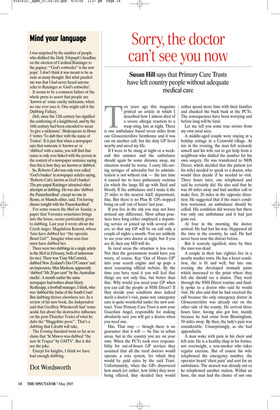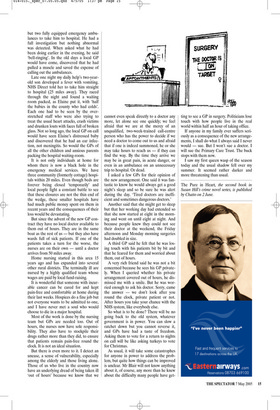Sorry, the doctor can’t see you now
Susan Hill says that Primary Care Trusts have left country people without adequate medical care Ten years ago this magazine printed an article in which I described how I almost died of a severe allergic reaction to a wasp sting, late at night. There is one ambulance based seven miles from our Gloucestershire farmhouse and it was out on another call, but the duty GP lived nearby and saved my life.
If I were to be stung at night or a weekend this summer and the ambulance should again be some distance away, my situation would be worse. I carry life-saving syringes of adrenalin but its administration is not without risk — the last time it caused me to have pulmonary oedema (in which the lungs fill up with fluid and blood). If the ambulance and I make it the 25 miles to the nearest A&E department, fine. But there is no Plan B. GPs stopped being on call ‘out of hours’ last year.
If you live in the city you may not have noticed any difference. Most urban practices have long either employed a deputising service or joined up with several others, so that any GP will be on call only a couple of nights a month. You are unlikely to see your own doctor at night, but if you are ill, then any MD will do.
In rural areas the situation is less rosy. Not that the government would have you worry, of course. Key ‘Out of Hours GP’ into your search engine and up pops a most reassuring official website. By the time you have read it you will feel that things are not only fine, but better than fine. Why would you need your GP when you can call the people at NHS Direct? If they decide your condition does indeed merit a doctor’s visit, panic not; emergency care is quite wonderful under the new contract. Your Primary Care Trust is now your Guardian Angel, responsible for making absolutely sure you will get a doctor when you need one.
Hm. That may — though there is no guarantee that it will — be fine in urban areas, but in the country you are on your own. When the PCTs took over responsibility for out-of-hours GP services they assumed that all the rural doctors would operate a rota system, for which they would be paid extra by the said Trust. Unfortunately, when the GPs discovered how much (or rather, how little) they were being offered, they decided they would rather spend more time with their families and chucked the buck back at the PCTs. The consequences have been worrying and before long will be fatal.
Let me tell you some true stories from my own rural area.
A middle-aged couple were staying at a holiday cottage in a Cotswold village. At ten in the evening, the man felt seriously unwell and his wife ran to get help from a neighbour who dialled the number for his own surgery. He was transferred to NHS Direct, which decided that the patient (or his wife) needed to speak to a doctor, who would then decide if he needed to visit. Three hours later, one telephoned and said he certainly did. He also said that he was 40 miles away and had another call to make first, 20 miles in the opposite direction. He suggested that if the man’s condition worsened, an ambulance should be called. His condition did worsen but there was only one ambulance and it had just gone out.
At four in the morning, the doctor arrived. He had lost his way. Happened all the time in the country, he said. He had never been near the district before.
But it scarcely signified, since by then the man was dead.
A couple in their late eighties live in a nearby market town. He has a heart condition, she is fit and well, but late one evening she developed stomach pains which increased to the point where they felt she should see a doctor. They went through the NHS Direct routine and finally spoke to a doctor who said he would visit. He also said that he had received the call because the only emergency doctor in Gloucestershire was already out on the other side of the county. He arrived three hours later, having also got lost, mainly because he had come from Birmingham, 50 miles away. By then, the lady’s pain was considerable. Unsurprisingly, as she had appendicitis.
A man woke with pain in his chest and left arm. He is a healthy chap in his forties, not overweight, a non-smoker who takes regular exercise. But of course his wife telephoned the emergency number, the operator heard ‘chest pain’ and sent for an ambulance. The nearest was already out so he telephoned another station. Within an hour, the man had the choice of not one but two fully equipped emergency ambulances to take him to hospital. He had a full investigation but nothing abnormal was detected. When asked what he had been doing earlier in the evening, he said ‘bell-ringing’. In the old days a local GP would have come, discovered that he had pulled a muscle and saved the expense of calling out the ambulances.
Late one night my daily help’s two-yearold son developed a fever with vomiting. NHS Direct told her to take him straight to hospital (25 miles away). They raced through the night and found a waiting room packed, as Elaine put it, with ‘half the babies in the county who had colds’. Each one had to be seen by the overstretched staff who were also trying to treat the usual heart attacks, crash victims and drunken louts with faces full of broken glass. Not so long ago, the local GP on call would have seen Elaine’s distressed baby and discovered that he had an ear infection, not meningitis. So would the GPs of all the other children and anxious parents packing the hospital waiting-room.
It is not only individuals at home for whom there is now a black hole in the emergency medical services. We have three community (formerly cottage) hospitals within 20 miles. Even though beds are forever being closed ‘temporarily’ and local people fight a constant battle to see that these closures are not the thin end of the wedge, these smaller hospitals have had much public money spent on them in recent years and the consequences of their loss would be devastating.
But since the advent of the new GP contract they have no local doctor available to them out of hours. They are in the same boat as the rest of us — but they also have wards full of sick patients. If one of the patients takes a turn for the worse, the nurses are on their own — until a doctor arrives from 50 miles away.
Home nursing started in this area 15 years ago and has expanded into several other rural districts. The terminally ill are nursed by a highly qualified team whose wages are paid by local fund-raising.
It is wonderful that someone with incurable cancer can be cared for and kept pain-free and comfortable at home during their last weeks. Hospices do a fine job but not everyone wants to be admitted to one, and I have never met a soul who would choose to die in a major hospital.
Most of the work is done by the nursing team but GPs are needed too. Out of hours, the nurses now have sole responsibility. They also have to stockpile their drugs rather more than they did, to ensure that patients remain pain-free round the clock. It is not an ideal situation.
But there is even more to it. I detect an unease, a sense of vulnerability, especially among the elderly and those living alone. Those of us who live in the country now have an underlying dread of being taken ill ‘out of hours’ because we know that we cannot even speak directly to a doctor any more, let alone see one quickly; we feel afraid that we are at the mercy of an unqualified, two-week-trained call-centre person who has the power to decide if we need a doctor to come out to us and afraid that if one is indeed summoned, he or she may take hours to reach us — if they can find the way. By the time they arrive we may be in great pain, in acute danger, or even in an ambulance on an unnecessary trip to hospital. Or dead.
I asked a few GPs for their opinion of the new arrangement. One said it was fantastic to know he would always get a good night’s sleep and so be sure he was alert during the day. ‘Tired doctors are inefficient and sometimes dangerous doctors.’ Another said that she might get to sleep but that her working day had extended so that she now started at eight in the morning and went on until eight at night. And because people knew they could not see their doctor at the weekend, the Friday afternoon and Monday morning surgeries had doubled in size.
A third GP said he felt that he was losing touch with his patients bit by bit and that he feared for them and worried about them, out of hours.
A very rich friend said he was not a bit concerned because he sees his GP privately. When I queried whether his private arrangement covered out of hours, he dismissed me with a smile. But he was worried enough to ask his doctor. Sorry, came the answer — we don’t look after you round the clock, private patient or not. After hours you take your chance with the NHS system, like everybody else.
So what is to be done? There will be no going back to the old system, whatever government is in power. You can slow a ratchet down but you cannot reverse it, and GPs have had a taste of freedom. Asking them to vote for a return to nights on call will be like asking turkeys to vote for Christmas.
As usual, it will take some catastrophes for anyone in power to address the problem, but quite how things can be improved is unclear. Mr Blair will not know anything about it, of course, any more than he knew about the difficulty many people have get ting to see a GP in surgery. Politicians lose touch with how people live in the real world within half an hour of taking office.
If anyone in my family ever suffers seriously as a consequence of the new arrangements, I shall do what I always said I never would — sue. But I won’t sue a doctor. I will sue the Primary Care Trust. The buck stops with them now.
I saw my first queen wasp of the season today and the usual shadow fell over my summer. It seemed rather darker and more threatening than usual.
The Pure in Heart, the second book in Susan Hill’s crime novel series, is published by Chatto on 2 June.




























































 Previous page
Previous page